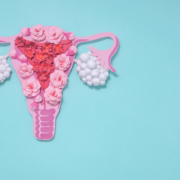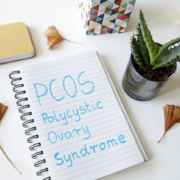Researchers estimate that the human body contains approximately seven quadrillion bacterial cells! Most of us hadn’t even heard the word “microbiome” until just a few years ago. But now the concept of gut health and gut flora are all over the news! It seems like every week a new connection is made between gut health and some other facet of wellness.
Research has recently shown that the balance of bacteria in our guts affects not only our gastrointestinal systems, but our hearts, kidneys, and even our brains and mental health! The microbiota of the skin has gotten some media attention as well.
The uterine microbiome, though, hasn’t received as much press time as it deserves! In fact, until quite recently scientists believed that the uterine environment was sterile (meaning there were no microorganisms present in it at all.)
Flora and microbiome and endometrium, oh my!
Let’s start by defining some of these words! Just as you’ve likely heard the plant life in a certain area referred to as the area’s flora and fauna, the term “flora” simply refers to the normal, beneficial bacteria that resides in or on the human body. “Microbiome” is just another way of referring to this healthy bacteria.
In this article, we’ll be discussing the unique microbiome of the uterus, which is contained in the endometrium. The endometrium is the lining of the uterus. This is the cushioning where a fertilized egg implants at the beginning of a pregnancy. In a normal menstrual cycle, the endometrium becomes thicker after ovulation in order to prepare for a potential pregnancy. It is then shed during menstruation if no pregnancy occurs.
Learning more about the unique microbiome of the uterus
Advances in modern medicine have allowed physicians to study the endometrium’s microbial environment with more precision than ever before. Early studies suggest that the most common bacterium in the uterus are called Bacteroides and Lactobacillus.
One study compared samples from the endometrium and vaginas of 35 infertile women undergoing in-vitro fertilization treatment. The results of this study revealed an important discovery: the women with more non-Lactobacillus bacteria in their microbiomes had decreased likelihood of implantation, pregnancy, and live birth.
Currently there are limited studies about the impact of the endometrial microbiome on fertility levels and success with IUI, IVF, and other fertility treatments. However, testing has recently become available to assess the endometrial lining for various types of bacterial flora. Hopefully this will open doors in the future for the ability to treat a uterine microbiome that is not ideal for conception.
Where does this beneficial bacteria come from?
Currently the most common theory is that the flora that populate the uterus ascend from the vaginal canal. The vagina has its own microbiome, and it can fluctuate frequently. Immediately prior to ovulation, for example, Lactobacillus levels tend to stabilize, then these levels drop during menstruation.
But are there other external and lifestyle factors that affect the balance of bacteria in the vagina (and thus the uterus)? Studies suggest that this may be the case! Menstruation, sexual activity, and use of period products like pads, tampons, and menstrual cups. There is also some evidence that the use of a copper IUD can increase an imbalance in the vaginal flora. Some other studies, however, suggest that the flora of the vagina are only affected by ethnicity and number of sexual partners. Clearly there is much we have yet to learn on this subject!
Another microbiome?
No discussion of bacteria’s influence on reproduction would be complete without a brief mention of yet another microbiome: the placental microbiome. After a pregnancy is achieved, any elements that interfere with the communication between the embryo and the uterine lining can interfere with the pregnancy. An imbalance in the uterine or placental microbiome, then, might set off an inflammatory response that can be possibly linked to a poor outcome and loss of the pregnancy.
You might be aware that the immune system becomes slightly suppressed during pregnancy in order to protect the developing embryo. This happens so that a woman’s body doesn’t recognize the developing embryo as an intruder and thus attacks it as a foreign object. If there is a severe imbalance in the flora of the uterus and placenta, then, it makes sense that the body would attempt to eliminate this. However, this attempt to exterminate the flora imbalance could lead to devastating consequences for a pregnancy.
You don’t have to struggle alone
These issues can be isolating and confusing, but we are committed to walking this journey alongside you and explaining all the nuances. Testing is now available to evaluate your uterine microbiome. Speak with your fertility doctor to see if you are a candidate for this testing based on your case!
To connect with Dr. Salem and her team, contact us today to arrange a consultation!










